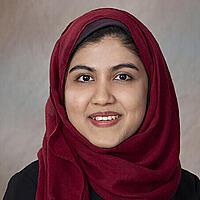Information Extraction & Fusion for Improving Personal and Public Health Safety
Sarah will demonstrate how to address the challenges of low training data, knowledge integration, and interpretability for safety-critical, pervasive applications w/ low tolerance.
Abstract:We are increasingly interacting with pervasive applications from a wide variety of domains, including smart health, intelligent assistants, and smart cities. However, tremendous challenges remain about understanding the effects of such interactions and ensuring the safety of pervasive systems. In this talk, I will demonstrate how deep semantic inference of the data generated from interactive, pervasive systems can improve personal and public health safety. For personal health safety, I tackle the challenge of detecting conflicting information and interventions originating from various information sources and health applications, respectively. I will present novel textual inference, time-series prediction, and information fusion techniques to (i) detect and predict conflicts and (ii) deliver safe, interpretable, and personalized health interventions. For public health safety, I address the challenge of providing real-time decision support to emergency responders. I will demonstrate a novel, weakly-supervised information extraction solution that enables the protocol-driven decision support pipeline of an intelligent assistant for emergency response. Throughout the talk, I will demonstrate how I address the challenges of low training data, knowledge integration, and interpretability for safety-critical, pervasive applications with low tolerance of error and domain constraints. Finally, I will propose natural language processing, multi-modal data fusion, and knowledge engineering techniques to develop more capable intelligent assistance and enhance data-driven decision support systems.
Bio: Sarah Preum is a Ph.D. candidate in the Department of Computer science at the University of Virginia (UVA), where she works with Professor John Stankovic. Sarah's research interest lies broadly in the intersection of artificial intelligence and cyber-physical systems, with a focus on increasing the safety and effectiveness of human-centric systems through information extraction and fusion. Sarah has developed novel natural language processing, knowledge integration, and temporal modeling techniques to provide personalized decision support for health safety. She received her M.Sc. in Computer Science at the University of Virginia in 2015. Sarah graduated from Bangladesh University of Engineering and Technology (BUET) in 2013 as a Summa Cum Laude with her B.Sc. degree in Computer Science and Engineering (CSE). Before joining UVA, she served as a lecturer in CSE at BUET. She also spent time at the Bosch Research and Technology Center as an AI research intern. Sarah is a recipient of the UVA Graduate Commonwealth Fellowship, the Adobe Research Graduate Scholarship, the NSF Smart and Connected Health Student Award, and the UVA Big Data Fellowship. Her work has been published in premier CS conference proceedings and journals, including ICDE, CIKM, PerCom, IPSN, ACM CSUR, and IEEE Trans. of CPS. More information about Sarah and her work can be found on her website: http://www.cs.virginia.edu/~sp9cx/
